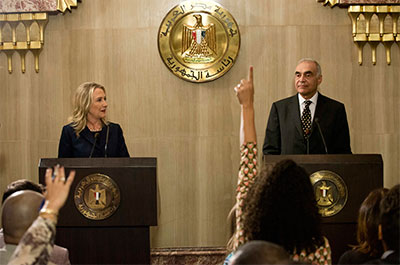The first test for the future of press freedom in Egypt since President Mohamed Morsi took office is not going well.
Actually, not much is going well. I recently returned from a month in Egypt and the country is in chaos. The power struggle between the Supreme Council for the Armed Forces (SCAF) and the Muslim Brotherhood’s Freedom and Justice Party, which Morsi represents, has led to dissolution of the lower house of parliament, or People’s Assembly. There is no constitution; and SCAF has annexed the interim constitutional declaration of last spring to assign itself sole authority over the state’s affairs, providing the president with a more or less ceremonial, albeit administrative, role. Garbage accumulates for longer on the streets of Cairo than it used to, and the traffic police are nowhere to be found. The lights are still on in Egypt, but only just.
Meanwhile, the country’s upper house of parliament, the Shura Council, which is dominated by the Freedom and Justice Party (and has not been dissolved–yet) announced on July 3 that it will begin accepting applications for new editor-in-chiefs of state-run publications, including the well-known dailies Al-Ahram and Al-Akhbar, according to news reports. A 14-member committee composed of six Shura members, four veteran journalists, and four communications professors will consider the applications; then a committee formed exclusively by Shura members will make the final selection, according to news reports.
Under ousted former President Hosni Mubarak’s regime, the Shura Council would simply appoint editor-in-chiefs, placing its own supporters in these powerful positions to ensure coverage sympathetic to the regime. Mubarak’s control over national newspapers was legendary–not one day would go by without his face on the cover of every state daily. CPJ research shows that many newspaper heads were corrupt; and if any dared to step out of line with the ruling party, they were replaced. Even after Mubarak’s overthrow, SCAF has used tactics of politicized trials to intimidate journalists.
Although holding elections would be a break from the former system, it would still ultimately leave the appointments in the hands of the Shura Council. The Egyptian Journalist’s Syndicate strongly condemned the decision and hundreds of journalists came out to protest against it, according to news reports. Hisham Abbas, a member of the syndicate, told Al-Jazeera in a July 6 interview that the group sees this as an attempt by the Muslim Brotherhood to place its supporters in key positions, much as Mubarak’s National Democratic Party would do. Other local journalists argued that the Brotherhood would use the process to get rid of editor-in-chiefs who were critical of the Islamist movement.
Gamal Fahmy, senior member of the syndicate, told the pan-Arab daily Al-Hayat, “They are inventing a system…where the press is managed like an institution that is dedicated to serving the interests of the ruling party by subjecting it to the control of the Shura Council.”
Furthermore, the legality of the Shura’s act is in question, since the council’s control of all state-run publications is endowed under the now-defunct constitution. A new constitution is being drafted by a committee appointed by SCAF which would define a new relationship between the Shura Council and the national press, according to news reports. So why the rush to elect new heads of national publications?
Diaa al-Rashwan of Al-Masry Al-Youm argued in an article that the Shura is trying to pre-empt the new constitution, which is expected to change its relationship with the national press.
Members of the Shura claim that by appointing new editor-in-chiefs, it can exhume corrupt editors from their posts and start fresh, especially by announcing a new list of requirements for the positions, according to news reports. These include: a candidate must be under 60 years of age, carry no previous criminal record, and have served at least 15 years at the publication which they are applying to head. If an appropriate candidate cannot be found to meet these requirements, then outside candidates may be considered.
I found Twitter and Facebook abuzz with local journalists in dismay, all delivering the same message–that the step has censorship written all over it.
Abeer Saady, vice chair of the Egyptian Journalists’ Syndicate, tweeted, “The problem is…that the press still belongs to the Shura Council without building an independent media body.”
The Egyptian Journalist’s Syndicate has called for the creation of an independent committee to carry out a transparent election process, according to news reports.
Although Morsi went through the motions of affirming his commitment to press freedom at a June 28 meeting with media heads, he has largely been uninvolved in this debate, and is mostly preoccupied with fighting for authority with SCAF.
SCAF, meanwhile, has a poor record for promoting press freedom over its 16-month rule. CPJ documented well over 100 attacks against journalists during this period, in addition to interrogations, threats, and court cases against journalists critical of the military body’s actions.
No matter where they come from, restrictions on the press impede an aspiring democracy. Regardless of who is ruling, whether it is the military council, the Muslim Brotherhood, Morsi, or all or none of the above, the press is vital to giving people access to information, especially in such times of uncertainty.
Perhaps the most warming sight I witnessed while in Egypt was the population’s incredible appetite for information. Citizens of all social backgrounds were reading both independent and state newspapers on every corner. By afternoon, newsstands across Cairo were sold out. If the Shura Council goes through with this process and uses it to impose censorship on state-owned newspapers, it will be up to the independent publications to furnish citizens with news. But it will be a major step back for press freedom and for the democracy that the country is striving for.
